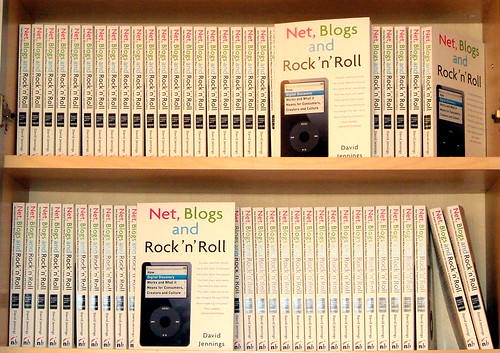The New Shape of Online Community
Monday, August 13, 2007
I’ve got an article just published in the new issue of First Monday called The New Shape of Online Community: The Example of Swedish Indie Music Fandom. It’s two things — a documentation/description of how this particular fandom is organized, and also an argument that the days of thinking of online community as associated with single domains is over. Instead, I argue that fans are organizing themselves across multiple sites, not just as individuals, but as distributed groups. This has implications for everyone from fans to scholars to site designers. As I summarize in the conclusion:
The Swedish indie fans practice what might be called “networked collectivism” in which loose collectives of associated individuals bind networks together. On the one hand, this means that groups can avail themselves of many mediated opportunities to share different sorts of materials including text, music, video, and photographs in real time and asynchronously. On the other hand, this creates many problems, particularly with coordination, coherence, and efficiency (i.e., the same materials must be distributed in multiple places, and sometimes there are many replicated efforts).
For those seeking to study online communities, this sort of social formation poses the methodological challenge of how to bound the object of study. It has long been the norm to go to an online space and study it. We have countless studies of particular newsgroups, Web forums, social network sites, and blogs. We have few studies that explore the connections amongst these disparate online platforms, despite the fact that people’s online activities are almost always distributed across multiple sites. It is no longer clear that going to a site is an appropriate strategy for studying community on the Internet.
One might liken the problem to that of a “pub crawl” in which a group goes from bar to bar drinking. One can do a fine study of any one of those pubs, and likely find something resembling community at play. Yet a slight shift of perspective from the space to the patrons reveals that for them, whatever community might be happening at that pub cannot be understood without reference to other spaces in which those people also meet.
From a practical perspective, this form of social organization poses problems for both individuals and those who want to connect and be connected with them. When a community is spread across multiple online spaces, it requires more time and effort for people to figure out what there is and to what extent in which spaces they will develop a community–specific identity. The analysis presented here suggests that with so many places to have discussion, it may be hard to reach the critical mass necessary to sustain ongoing conversation anywhere, with potential negative consequences on the development of shared meanings within groups.
Developers face the practical problem of how they can make sites that serve as both locations of activity and which can be exported to other sites in order to build connectivity across locations. Last.fm’s exportable charts are one example of responding to this emerging demand, as is Virb’s built–in capacity to import blogs and photo feeds from other sites into one’s profile.
At a time when organizations from rock bands to public health services are increasingly turning to the Internet to reach their audiences, it is not enough to create one’s own site or to get on MySpace. Like the community members, they need to immerse themselves in this ever–more distributed and complex terrain in order to understand which online sites to target and how.
I’ve got at least one more paper on the topic of Swedish indie fandom in the works, so am quite interested to hear any feedback on this paper. And I hope you find it useful or at least fun to read.

